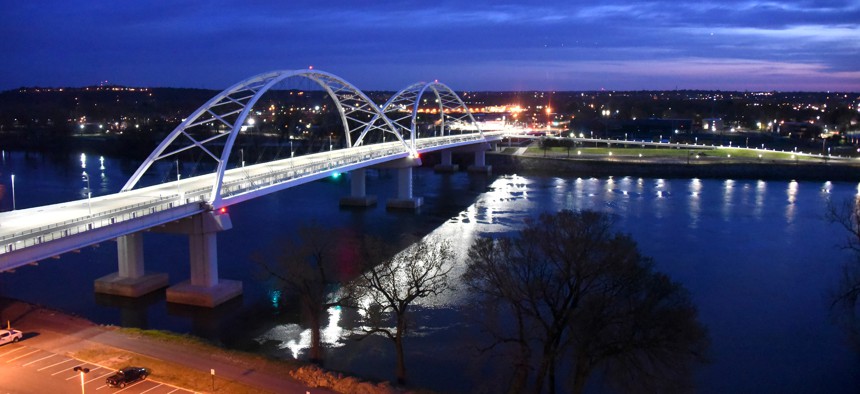How Little Rock is Harnessing Data to Become a Smarter City

Little Rock, the capital of Arkansas, is a city on the Arkansas River. Paul Harris via Getty Images
“My team and I, we’re focused on getting things done, but with a data-driven approach,” says the mayor of Arkansas’ capital.
Editor’s note: This is the third article in a series that Route Fifty is publishing ahead of Smart City Expo USA, which will take place Sept. 14 and 15 in Miami Beach, Florida. More than 100 speakers and several thousand attendees are expected. Route Fifty is a media partner and will be covering the event. More information about the expo can be found here. The other articles in the series can be found here. Thanks for reading!
Frank Scott made history when he became the first Black elected mayor of Little Rock, Arkansas, after his 2018 election. Scott is currently the president of the African American Mayors Association. As mayor, Scott has emphasized the need to collect, use and share data on city services to improve the city’s responsiveness with the public.
Route Fifty talked with Scott about how Little Rock is working toward these goals in Arkansas’ capital city. This transcript has been edited for clarity and brevity.
Can you tell me how you and your administration have used data to inform your decision making?
Our mission is to unite, grow and transform the city of Little Rock. We seek transformation, we think of it in terms of transformation, equity and accountability. That’s our TEA format.
One of the things we focused on is our Open Data website in our monthly City Stat meetings, because they influence our decision making. We also have a Little Rock Citizens Connect website, where one of our initiatives there is our Lights On streetlight mapping tool, which encourages our residents to canvas [their neighborhoods] and report streetlight outages. That clearly helps not only with quality of life and place but with crime prevention.
We launched a 311 app and a Your LRPD app to promote transparency and accessibility, not only for public works issues and code enforcement, but also to keep our citizens informed about what’s going on with crime.
One of the other things we’re doing is launching a real-time crime center that incorporates technology in how we’re addressing crime and putting additional eyes on the street to be smarter on crime.
Can you tell me how that improves equity in the city?
In our City Stat meetings, we overlay not only the crime in an area but also whether or not the area has food deserts, the income situation for residents there. We talk about what we can do to provide wraparound services in those particular areas to help curb crime with a holistic approach.
We have a community schools model within our targeted community development areas that need more economic and equitable assistance. Unfortunately, those areas tend to be high-crime areas, so we’re able to deploy personnel, equipment and technology to address crime but also quality of life and place.
Tell me more about the Lights Out initiative. That can be a big complaint among residents if it takes too long to replace burned out streetlights.
Certain areas with high crime also consistently have lights out. Ultimately, though, the city of Little Rock doesn’t own the lights in our city. We don’t run our [power] utility, but we do pay a franchise tax. So it’s a partnership. It not only gives our public works department more autonomy, but it also empowers our residents as well.
How do you get the utility to respond to those requests?
They make it a priority because, being the largest city in the state, we’re one of their biggest customers. Our franchise fees that we pay them helps them out, so they tend to listen. It’s the power of the purse and the wallet.
Even before you became mayor, Little Rock has earned a reputation for innovation in city government. It received a lot of attention for creative lighting of one of your bridges, and it has used EPA money to revive parts of downtown. Is there a reason why this approach has taken hold in Little Rock?
Little Rock is the birthplace of fintech, through a company that became FIS, one of the largest financial technology companies around. We created an ecosystem of financial technology companies alongside other technology companies. We’ve really bred a lot of tech-savvy leaders, which helps build that culture of technology in our city.
Ultimately, that brings us to an understanding that technology plays a critical role in efficiency and effectiveness to ultimately execute a mission. My team and I, we’re focused on getting things done, but with a data-driven approach.
What other aspects of city government are you excited about applying technology and data analysis to?
We’re definitely looking to do more with financial literacy and connecting the dots to health care [accessibility], so we’re looking at how other cities are handling that.
We’ve got a 2030 renewable energy plan. When you look at what’s happening to other cities as the result of climate change, we’ve got to figure out how we’re addressing that. We have to monitor our efficiency and use more renewable energy.
Daniel C. Vock is a senior reporter for Route Fifty based in Washington, D.C.
NEXT STORY: Why Smart Cities are About More Than Just Tech






